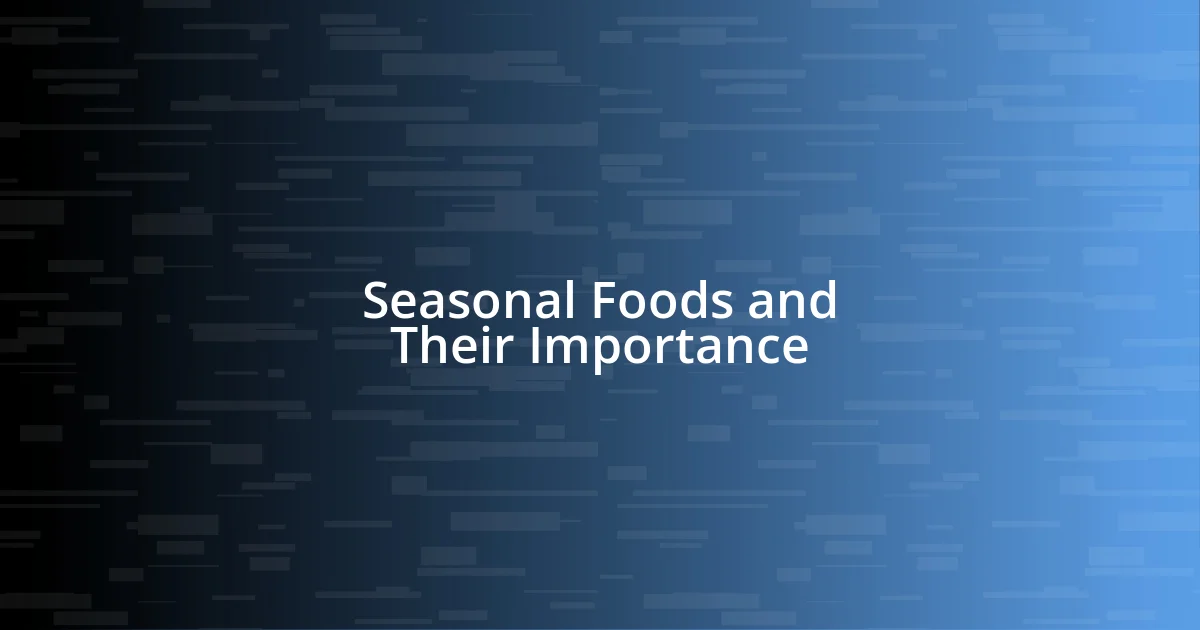Key takeaways:
- Farmers’ markets serve as vibrant community hubs, fostering connections between farmers and consumers while supporting local economies.
- Fresh produce from these markets offers superior flavor, nutritional value, and encourages a seasonal diet, enhancing culinary creativity.
- Engaging with vendors and other shoppers at farmers’ markets promotes a sense of community and inspires individuals to explore new flavors and cooking methods.

Understanding Farmers’ Markets
Farmers’ markets are much more than just a place to buy produce; they are vibrant community hubs. I remember my first visit to a local market, the air buzzing with laughter and conversation, the scents of fresh herbs and ripe fruits weaving together. It struck me then how these markets could turn a simple shopping trip into a social event.
One of the most fascinating aspects of farmers’ markets is the connection between the farmer and the consumer. Have you ever tried asking a vendor about their farming practices? I did this once, and hearing the passion in the farmer’s voice as he described his organic methods gave me a new appreciation for the food I was buying. It’s moments like these that remind us of the craftsmanship behind our food.
Additionally, there’s something deeply satisfying about supporting local economies. When you purchase directly from farmers, you’re not just buying tomatoes; you’re investing in your community. I often feel a sense of pride as I select my produce, knowing that my contribution helps to sustain local livelihoods and preserve our agricultural heritage. Isn’t it empowering to feel that your choices can make a tangible difference?

Benefits of Fresh Produce
Fresh produce brings a myriad of benefits that go beyond taste. For me, every bite of a sun-ripened strawberry feels like a sweet reminder of summer’s magic. There’s a vivid vibrancy in fresh fruits and vegetables that’s just not present in store-bought alternatives. That freshness is not merely an aesthetic; it often translates to higher nutritional value, which can make a significant difference in our well-being.
Here are some key benefits of fresh produce:
- Nutrient Density: Fresh fruits and vegetables retain more vitamins, minerals, and antioxidants, which are essential for our health.
- Flavor and Freshness: The juiciness of a freshly picked peach or the crunch of a garden-fresh cucumber can awaken your palate like nothing else.
- Seasonal Variety: Eating fresh means enjoying the best nature has to offer in its prime season, encouraging a diverse diet.
- Connection to Nature: There’s a profound sense of joy I feel when I bite into a fresh carrot, knowing it was harvested just hours earlier, reminding me of our bond with the earth.
In my experience, each visit to the farmers’ market feels like a mini-adventure in taste discovery. I remember the last time I tried a local heirloom tomato. Its rich, complex flavor was a revelation compared to the bland varieties often available at supermarkets. This experience solidified my belief that fresh produce not only nourishes our bodies but can profoundly impact our cooking and eating experiences.

Supporting Local Farmers
Supporting local farmers is an experience that deeply resonates with me. I recall one sunny Saturday at the market when I spotted a farmer selling heirloom vegetables. The vibrant colors immediately drew me in, and as I chatted with him, I learned how he uses sustainable practices to grow those beautiful carrots and tomatoes. It felt incredible to put a face to the food I was buying, solidifying the idea that my purchases empower individuals who are passionate about their craft.
When I support local farmers, I know I’m playing a role in a larger story of resilience and community. Every dollar spent at a farmers’ market circulates within my community, reinforcing local economies and fostering relationships. There’s something particularly magical about knowing my purchases help keep a family farm afloat, especially in an age where big agricultural corporations dominate the landscape.
Moreover, farmers’ markets create a unique synergy between farmers and consumers. I find it heartwarming to see families coming together, discussing recipes, and learning directly from those who cultivate their food. Participating in this exchange nurtures not just our bodies but our spirits too. It’s a continuous reminder that agriculture is not just a business; it’s a labor of love, deeply intertwined with the community it serves.
| Local Farmers | Corporate Agriculture |
|---|---|
| Personal connections | Anonymous transactions |
| Seasonal varieties | Standardized selections |
| Support for local economies | Profit-driven motives |
| Sustainable practices | Mass production |

Community Engagement at Markets
When I stroll through a farmers’ market, the sense of community is palpable. Just the other week, I overheard a young boy asking his mom why the tomatoes looked different from grocery store ones. She explained the importance of variety and how each vendor has a unique story and purpose. Moments like that remind me how markets serve as educational hubs, connecting people of all ages to the food they consume and the local ecosystem.
Engagement goes beyond just transactions; it’s about forging relationships. I’ve often found myself chatting with vendors, learning about their farming practices or the story behind a unique crop. This interaction brings a depth to the experience, transforming a simple shopping trip into a meaningful conversation. Have you ever felt that warmth when you realize the vendor remembers your name or your favorite fruit? That mutual respect fosters a tight-knit community, where everyone feels valued and heard.
Moreover, these markets are a melting pot of cultures, ideas, and experiences. I remember attending a local market’s autumn festival, where different food stands showcased ethnic dishes. I gleefully participated in trying new flavors while sharing recipes with newfound friends. This exchange isn’t just about food; it’s a celebration of our diverse backgrounds, encouraging us to break bread and share stories. Isn’t it fascinating how a simple gathering can spark such powerful connections?

Seasonal Foods and Their Importance
Seasonal foods hold a special place in my heart, not just for their freshness but for their connection to the rhythms of nature. I remember last summer, picking sweet peaches at the farmers’ market, their aroma wafting through the air. There’s nothing quite like biting into a sun-ripened peach; it’s a reminder of the brief window we have to enjoy nature’s bounty before the season changes.
Eating with the seasons encourages us to embrace variety in our diets, which I’ve found makes meals more exciting. Have you ever noticed how each season brings its own host of flavors? When fall arrives, I eagerly anticipate the earthy sweetness of butternut squash and the vibrant crunch of Brussels sprouts. These seasonal ingredients not only nourish our bodies but also inspire creativity in the kitchen. It’s exciting to experiment with whatever is freshly available, turning mundane meals into delightful culinary adventures.
Moreover, consuming seasonal foods supports a sustainable approach to eating. I recall a conversation with one vendor who explained why seasonal crops are often more nutritious—they’re harvested at their peak and require fewer resources to grow. This discussion opened my eyes to the impact of my choices. When I choose seasonal produce, I feel like I’m making a conscious decision to protect the environment and support local agriculture. Isn’t it invigorating to know that what we put on our plates can have a broader impact on our community and the planet?

Tips for Shopping at Markets
When I hit the farmers’ market, one tip I swear by is to arrive early. There’s something magical about the freshness of produce right at opening time. I fondly remember one vibrant Saturday morning, when I snagged the last basket of sun-kissed strawberries just as the vendor was unpacking. The early bird truly does get the tastiest treats!
I’ve also learned that bringing cash can elevate your shopping experience. While some vendors accept cards now, cash often means quicker transactions and the chance to haggle a bit. I often find the vendors are more willing to strike up a deal if I’m paying with cash. Who doesn’t love saving a little money while supporting local farmers?
One practical tip I always share is to carry reusable bags. Not only are they eco-friendly, but they’re also way sturdier than those flimsy plastic ones. Last time I forgot mine, I ended up juggling a handful of produce, and let me tell you, it was quite the balancing act! Having a sturdy bag makes the entire experience smoother and allows you to transport your fresh finds with ease. Have you ever had to dash back to your car because you forgot a bag? Trust me, it’s not fun!

Cooking with Farmers’ Market Finds
Cooking with the treasures I find at the farmers’ market brings a unique joy to my kitchen. Just the other day, I stumbled upon a vendor selling heirloom tomatoes in an array of colors. Their vivid hues inspired me to whip up a simple caprese salad. Have you ever tasted a dish made from ingredients that were picked just hours ago? The flavors are so vibrant, you can almost feel the sunshine in each bite.
One evening, after a rewarding trip to the market, I came home with a bounty of fresh herbs, zucchini, and bell peppers. I can still remember the fragrant aroma that filled my kitchen as I sautéed those veggies. Each slice, each chop felt like a celebration of the season. It reminded me how cooking can be a creative expression, turning ordinary ingredients into extraordinary meals. Do you ever find yourself lost in the act of cooking, inspired by the colors and scents around you?
I’ve found that cooking with farmers’ market finds also encourages spontaneity in my meal planning. When I see something unusual—like purple cauliflower or vibrant radishes—I can’t help but get excited about trying new recipes. Just last week, I challenged myself to create a stir-fry with a medley of unexpected vegetables. The result was not only delicious but also a fun reminder of how stepping out of my culinary comfort zone can lead to delightful surprises. Does cooking this way inspire you to explore new flavors, too?














